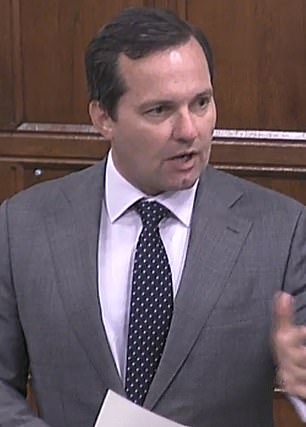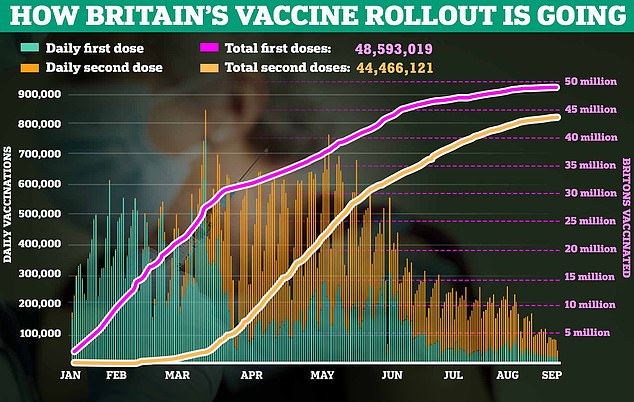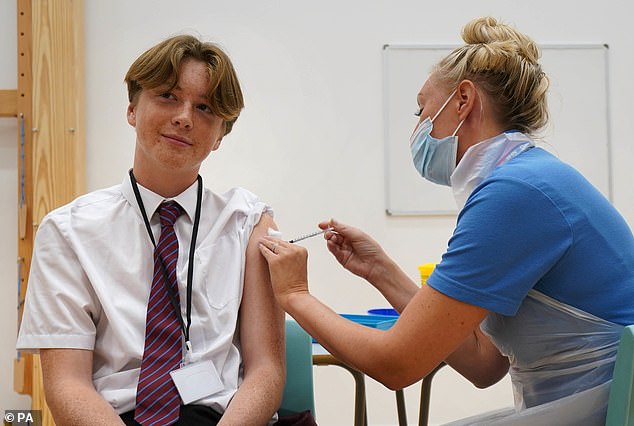Tories today slammed the ‘perverse’ decision to extend the Covid vaccine rollout to children as young as 12.
In the first parliamentary debate about the controversial expansion of the jab drive, Conservative MPs said it did not make sense now that Britain was ‘through the worst of the pandemic’.
They questioned the move to leave the final say on vaccination with children, if they are deemed competent enough, given that experts are torn on the health benefits and ethics.
Britain began inoculating healthy secondary school-aged children with a single dose of Pfizer’s vaccine for the first time yesterday.
It did so despite originally not getting the blessing from No10’s vaccines advisory panel, which said the health benefit to youngsters was ‘marginal’.
The Joint Committee for Vaccination and Immunisation (JCVI) left the decision to Chris Whitty and the chief medical officers in the devolved nations. They signed off on the plans on the basis that it could prevent hundreds of thousands of school absences.
Bolton West MP Chris Green said in the Commons: ‘In many ways we can objectively say we are through the worst of the pandemic and yet the more draconian or authoritarian measures are being introduced at this stage. It’s perverse.’
MP for Penistone and Stocksbridge Miriam Cates, who led the debate, questioned the logic behind the plans, adding: ‘Children are not disease spreaders, they’re not a buffer for our healthcare system and they’re not an economic inconvenience.’
And MP Derek Thomas added said the decision to override the JCVI’s original advice ‘undermined confidence in the very vaccine rollout programme’.


Conservative MPs have slammed the Government’s decision to extend the vaccine rollout to all over-12s. Bolton West MP Chris Green (left) described it as ‘perverse’ while MP for Penistone and Stocksbridge Miriam Cates (right) says the Government put pressure on the JCVI to reach a decision quickly

Revealed: The logistics of vaccinating over-12s in schools
How will it work?
The NHS has already been asked to prepare to offer Covid vaccines to 3million 12 to 15-year-olds.
Doses will mostly be administered through the school vaccination programme, which manages HPV and flu inoculations in schools every year.
Official figures showed almost 90 per cent of children offered the HPV vaccine every year take it.
Children will likely receive their vaccines in suitable areas such as school halls. They will be delivered by nurses, healthcare support workers and administrative staff.
Parents are set to receive a letter revealing the plans for jabbing kids in the coming days, No10’s vaccine minister Nadhim Zahawi revealed today. They will also be asked to consent to their child receiving the vaccine.
Will it need parental consent?
Under-16s are not automatically presumed to be legally competent to make decisions about their healthcare and, therefore, whether they should get the Covid jab.
But the courts have previously ruled that under-16s are competent to give consent to an intervention if they have ‘sufficient understanding and intelligence to understand fully what is proposed’.
This is known as the ‘Gillick test’, and has been in place since the 1980s.
The test is normally carried out by a medical professional or nurse, who assesses the child’s maturity, and their understanding of the advantages, disadvantages and potential long-term impacts of vaccination. They then give a view on whether the child is competent to consent to vaccination.
Can children overrule their parents?
Mr Zahawi said today that children as young as 12 could be able to overrule their parents to get the vaccine.
But he admitted this was likely to be a ‘very rare occurrence’ for the youngest children. He also said parents should not be ‘stigmatised’ if they are hesitant about their children being vaccinated.
Mr Zahawi said children would only be able to choose to have the coronavirus vaccine against their parents’ wishes following a meeting with a clinician.
The deputy head of the JCVI Professor Anthony Harnden said there was ‘sliding scale’ of competency, meaning it would be easier for a 15-year-old to overrule their parents than a 12-year-old who is ‘less likely to be deemed competent’.
Professor Chris Whitty said, in terms of medical consent: ‘In the majority of cases, children and their parents come to the same decision.’
Advertisement
More than 3million under-16s are eligible for the vaccines and ministers expect at least 60 per cent to take up the offer.
The jabs began at some schools in England yesterday and the rollout is due to begin in Scotland and Wales later this week.
In Northern Ireland, the head of the region’s vaccination programme said jabs are likely to be offered in schools from October.
Mr Green said there was little need to extend the rollout further because of the success of adult vaccination.
He said: ‘We’ve seen the first and second wave having a huge impact on us. We’ve seen the third wave being far less impactful.
‘All of our vaccines are effective against all variants of concern and at this time we see compulsory vaccination in the care sector — no doubt shortly to be rolled out into the NHS and therefore after that other sectors in society.
‘We see the establishment of the principal of vaccine IDs, domestic ID cards. There’s a pause at the moment in England but we can see in Scotland and in Wales these causes are being advanced.
‘In many ways we can objectively say we are through the worst of the pandemic and yet the more draconian or authoritarian measures are being introduced at this stage.
‘It’s perverse.’
Karl McCartney, the Tory MP for Lincoln, highlighted issues around the lack of parental consent needed for children to take a vaccine.
He said: ‘As no trials that have been definitive have been made public, I fail to see how any child can be ” fully informed” [about the safety of vaccines].’
All vaccine trials show that jabs are safe for the vast majority of children and many countries in the West including the US, Spain and Italy have been rolling out inoculations to over-12s for months.
There is a small one in 10,000 risk of myocarditis — an extremely rare form of heart inflammation that is not necessarily serious — in children. It is slightly more prevalent in boys but doctors say most cases are treatable.
But the long term implications of the condition are not yet fully understood.
JVI member Professor Adam Finn, a paediatrician at the University of Bristol, this weekend said vaccines appear to be safe in children but urged parents who were unsure to wait six months for more long-term safety data to emerge.
Meanwhile, Ms Cates said it was ‘surprising to say the least that the Government put political pressure on the JCVI to reach a decision quickly about the vaccination of children’.
She said: ‘I think there are some very difficult issues around parental consent and the vaccine, and whether any child can know enough about the potential benefits, the potential risks and I think this is going to be a very difficult question for schools, for health authorities and for parents.’
Ms Cates said the way the decision to vaccinate healthy 12- to 15-year-olds had been made ‘should give us pause for thought’.
She said: ‘For no other cohort has the Government questioned the JCVI’s advice.
‘Why have we departed from this stance when it comes to children and look for reasons other than direct medical benefit to press ahead?
‘When there are concerns about future health of our children, why haven’t we waited for more evidence to emerge?
‘Children are not disease spreaders, they’re not a buffer for our healthcare system and they’re not an economic inconvenience.’
St Ives MP Mr Thomas added: ‘The impact of this decision to override the JCVI advice is to undermine confidence in the very vaccine rollout programme.
‘Up until now, because of the way the JCVI has operated, the country has welcomed the approach and had confidence in it and supported it.
‘I wonder if the Government is doing itself a disservice by undermining the confidence in this.’

Fifteen-year-old Quinn Foakes receiving a Covid-19 vaccination at Belfairs Academy in Leigh-on-Sea, Essex
But new vaccines minister Maggie Throup, who replaces Nadhim Zahawi who was promoted to Education Secretary, said: ‘The unanimous recommendation of the UK’s CMOs is to offer all remaining 12 to 15-year-olds a first dose of the Pfizer vaccine with further JCVI guidance needed before any decision of a second dose.
‘They have been clear they are making this recommendation based on the benefits to children alone and not on the benefits to adults or wider society.
‘At every point in our vaccination programme we have been guided by the best clinical advice.’
Adviser admits jabs would not have been recommended for use on children in normal times
A government advisor over the weekend admitted the Covid vaccine would not have been recommended for children in normal times until it had been fully investigated.
Professor Adam Finn, a member of the Joint Committee on Vaccination and Immunisation (JCVI), said scientists did not have the ‘luxury’ of time to research the possible risks of jabbing children and would usually have collected more evidence before recommending their use on teens.
It comes after the school rollout of jabs for children aged 12 to 15 was given the go ahead last week, with the vaccinations set to start on Wednesday.
But Finn said parents were justified in waiting an extra three to six months to get their children jabbed until the risks were made clearer with further research, the Times reported.
Finn added the decision on whether to vaccinate 12 to 15-year-olds is not black and white, adding that while it is not ‘essential’ for them to have a coronavirus jab, it is also ‘perfectly sensible’ for them to do so.
Advertisement
The scientific community has been split over vaccinating healthy children against Covid because the virus poses such a low risk to them.
The JCVI said earlier this month that immunising them would only provide ‘marginal’ benefit to their health, and not enough to advise a mass rollout.
But Professor Chris Whitty and the chief medical officers in the devolved nations came down in favour of expanding the inoculation drive after weighing up the wider benefits to children.
They said hundreds of thousands of school absences could be prevented and school closures averted if there was good uptake of the vaccines.
And Labour’s shadow vaccine minister Liz Kendall insisted extending the rollout was the right decision for children’s safety and said the Government should have moved to do so sooner, citing the US, Spain and Italy as countries who have successfully prevented disruptions to education through their rollouts.
Speaking at the debate today, she said it was not true that ministers had ignored the JCVI.
Ms Kendall said: ‘It is not true to say that the JCVI advice has been undermined, as I have heard several times in this debate.
‘The JCVI says, and I quote: “It is not within our remit to incorporate in-depth considerations on wider societal impacts, including educational benefits.
‘”The Government may wish to seek further views on the wider societal impacts from the CMOs of the four nations with representation from JCVI on these wider discussions”.’
‘They recommended the wider societal impacts were looked at. That is not undermining the JCVI’s decision, it is putting it into practice.’
She added that she was ‘appalled’ at reports of headteachers receiving threats from anti-vaxx parents in her constituency of Leicester.
In response, Mrs Throup said: ‘I absolutely condemn intimation and threats to headteachers, school staff and anybody who enters school premises.
‘I feel that this is a very big issue and my advice to headteacher who have received such intimidation is that they rapidly the School Age and Immunisation service, who are well versed in addressing this issue, and not be afraid to speak to the police and local authority as well.’
Source link : https://www.dailymail.co.uk/news/article-10012671/Tories-slam-No10-perverse-12s-Covid-vaccines.html











